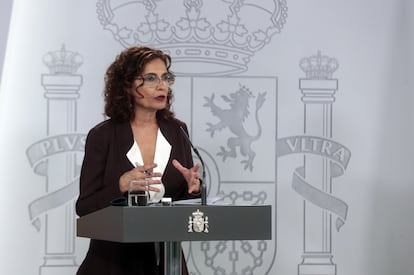Spain will slowly return to “normal life” starting on April 26, says government
Technical experts will decide on the conditions of the gradual deescalation of confinement measures introduced to combat the spread of the coronavirus

Life in Spain will slowly begin to return to normal after the state of alarm, introduced three weeks ago to slow the coronavirus outbreak, comes to an end on April 26. That’s according to Finance Minister and government spokesperson María Jesús Montero.
Speaking on Spanish TV channel Antena 3 on Wednesday, Montero said that Spain would slowly return to “normal life” but in progressive stages, following the recommendations of health experts in order to avoid a second wave of coronavirus infections.
We can’t take anything for granted right now, only that the extension of the state of alarm will last until April 26María Jesús Montero, government spokesperson
“We can’t take anything for granted right now, only that the extension of the state of alarm will last until April 26,” she said. “From that moment on, the relaxation [of the confinement orders] will happen progressively so that citizens can begin, in an orderly fashion, to return to normal life, to the streets, to the public squares.” The minister added that the lifting of the lockdown rules must be well planned and organized “so that there are no [new] peaks and infections.”
Montero said the government is working on “different scenarios” on how the confinement measures could be eased, but refused to go into further details until “the experts decide” on how to proceed. According to the minister, more information on the spread of the outbreak is still needed before any decision can be made.
Spaniards have been confined to their homes since March 14, when the government implemented a state of alarm in a bid to control the coronavirus crisis. All public-facing businesses have been closed since then, while border controls have been restricting the movement of people.
Taxes
In the interview, Montero added that the government’s “strict” definition of what constitutes a coronavirus victim was responsible for the gap between the Health Ministry’s official figures on coronavirus deaths and the death records at civil registries across Spain.
Montero also explained that the government does not plan to suspend tax payments because it needs funds to continue to support citizens who receive unemployment benefits and other social aid. In March, the government approved measures to help businesses and self-employed workers with cash-flow problems, and introduced a six-month moratorium on the payment of several taxes, including income tax (IRPF), corporate tax and value-added tax (VAT). The minister said that the government was considering the possibility of extending the payment deadline of other taxes.
English version by Melissa Kitson.
Tu suscripción se está usando en otro dispositivo
¿Quieres añadir otro usuario a tu suscripción?
Si continúas leyendo en este dispositivo, no se podrá leer en el otro.
FlechaTu suscripción se está usando en otro dispositivo y solo puedes acceder a EL PAÍS desde un dispositivo a la vez.
Si quieres compartir tu cuenta, cambia tu suscripción a la modalidad Premium, así podrás añadir otro usuario. Cada uno accederá con su propia cuenta de email, lo que os permitirá personalizar vuestra experiencia en EL PAÍS.
¿Tienes una suscripción de empresa? Accede aquí para contratar más cuentas.
En el caso de no saber quién está usando tu cuenta, te recomendamos cambiar tu contraseña aquí.
Si decides continuar compartiendo tu cuenta, este mensaje se mostrará en tu dispositivo y en el de la otra persona que está usando tu cuenta de forma indefinida, afectando a tu experiencia de lectura. Puedes consultar aquí los términos y condiciones de la suscripción digital.








































